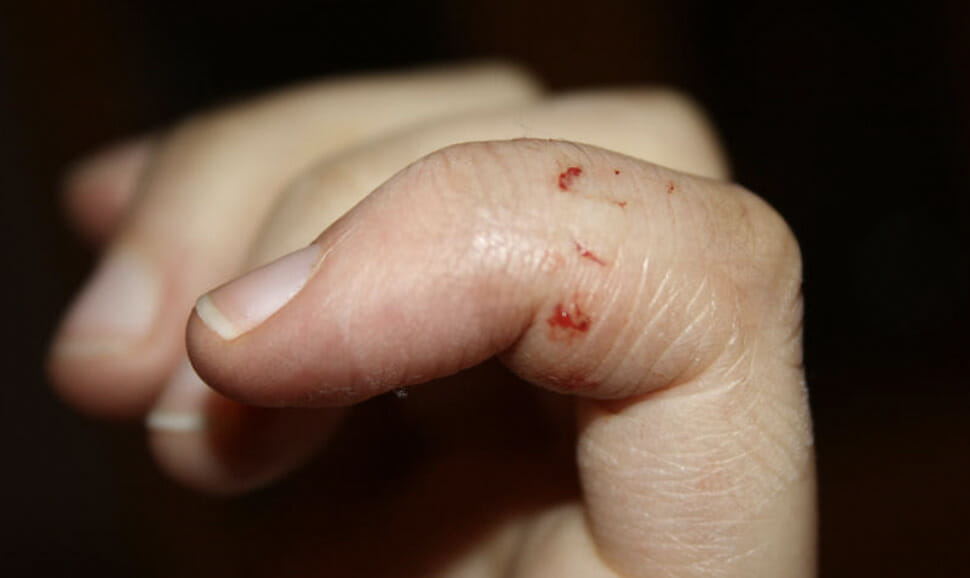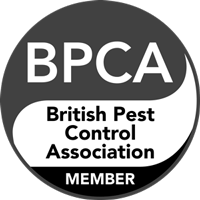Table of Contents
Rats do bite and it’s surprisingly dangerous for us when they do. Rats are mostly pretty scared of us humans and will scurry around in the shadows to avoid contact with us. They are also nocturnal animals, so we rarely cross paths. However, this doesn’t mean that rats won’t bite us if they feel it’s necessary! For example, say you’ve cornered a rat trying to remove it from your property; the rat will be terrified and will retaliate using its teeth and claws – doing anything it can to escape and survive.
Continue reading our guide to rat bites to discover the dangers associated with rat bites, what to do if a rat ever bites you, and how to prevent the situation from ever occurring in the first place.
Why do rats bite?
Rats are usually rather solitary creatures who will avoid humans at all costs. When they invade your home, they will usually build nests in the loft space – an ideal place to hide and not be bothered by us. They are mostly only active during the night when they know there’s nobody around to detect or disturb them.
However, as much as they try to stay hidden, it’s inevitable that you will detect their presence and try to remove them. This is when the danger arises. If a rat feels threatened, it will turn violent and do anything it can to survive and escape, including scratching and biting.
When threatened, rats can be dangerous, and only a tiny bite could be fatal. This is why we always recommend using our emergency rat removal in London services to keep you and your loved ones safe.
What does a rat bite look like?
Rats have two more prominent incisors at the front of their mouth, so when bitten by a rat, you will usually have a small, singular wound caused by these front teeth. Depending on how desperate the rat is feeling in the situation, you may end up with numerous minor cuts and scratches, which are unfortunately more dangerous than they look. Rat-bite injuries will usually bleed as they can be deeper than they look and may also begin to swell. If left untreated, the bite may become infected, and you would start to notice pus in the wound.

How to treat a rat bite?
If you’re unfortunate enough to be bitten by a rat, you must immediately treat the wound. First, wash the affected area with soap and warm water, dry the injury, and place an antibiotic treatment onto the site before covering it with a clean bandage.
No matter how minor the injury appears to be on the surface, we highly recommend visiting a healthcare professional to be checked out properly. In addition, you may require a tetanus jab if it’s been a while since your last one to protect yourself from further illnesses. In some cases, if there are signs of infection, you may require a course of antibiotics.
Keep an eye out for signs of an infection, including:
- redness
- pus
- the inflicted area is warm to the touch
- chills
- high temperature
- throbbing pain around the bite
If you notice any of these signs, visit your doctor immediately for a course of antibiotics to clear the infection.
Dangers of rat bites
Rats are infamous for spreading diseases and viruses throughout history. They are known carriers of diseases, including Leptospirosis, Hantavirus and even the plague! Read our Diseases from Rats guide to discover more about the diseases that rats carry and their symptoms.
While they can carry several diseases, the one most commonly spread via biting is the aptly named “Rat-bite fever”.
Rat Bite Fever
Rat-bite fever, surprisingly, is transmitted via rat bites. However, other rodents can also spread the condition, including mice and squirrels, for example. In most cases, this disease will present itself in the form of an uncomfortable rash that resembles bruising on the skin’s surface.
Two different strains of bacteria cause two types of rat-bite fever (RBF); Streptobacillary RBF and Spirillary RBF, the first being the most common type.
Streptobacillary Rat-Bite Fever
The most common of the two types of RBF is caused by the bacteria Streptobacillus moniliformis. In most cases, a standard course of antibiotics from your doctor can treat the disease. Symptoms will begin to show between 3-10 days after the initial bite. These include:
- high temperatures
- chills
- headaches
- sickness
- diarrhoea
- bruise-like rash
- muscle aches
If you notice any of these symptoms appearing following a rat bite, then seek medical attention immediately. As previously mentioned, standard antibiotics should be enough to clear the disease; however, if left untreated, RBF can develop into much worse illnesses.
Spirillary Rat-Bite Fever
The less common type of RBF is caused by the bacterium Spirillum minus. Again, in most circumstances, this condition can be treated via a course of antibiotics from your healthcare provider. Unlike Streptobacillary RBF, the symptoms for Spirillary RBF can take much longer to appear, in some cases taking up to three weeks to present themselves. Bear this in mind following a rat bite, as you may think you’re in the clear until any signs do arise. Look out for these symptoms:
- high temperatures
- chills
- sore throat
- headaches
- muscle pains
- bruise-like rash
- vomiting
- swelling of the lymph nodes
- ulcers developing around the site of the wound
Visit your local doctor if you begin to display these signs following a rat bite.
Untreated Rat-Bite Fever
Rat-bite fever itself is mostly easy to cure via antibiotic courses. However, people may not recognise the signs or believe they can fight it off themselves. When left untreated, RBF can lead to severe health conditions. These problems include:
- Pneumonia
- Meningitis
- Kidney failure
- Heart failure
- Inflammation of the heart
- Endocarditis
- Abscesses
- Hepatitis
As you may be aware, many of these illnesses are life-threatening, meaning it is vital to seek medical attention if bitten by a rat.
Preventing rat bites
To prevent being bitten by a rat and contracting a potentially life-threatening illness, it’s essential to contact a pest control expert as soon as you notice signs of rats on your property.
At Integrum, we have over 70 years of pest control experience, meaning we know exactly how to remove rats safely. So keep yourself and your loved ones safe by leaving it to the experts!
Our fully qualified pest experts are licensed to use professional-grade equipment, including poisons and traps guaranteed to remove the danger of rats from your home.
For all enquiries and quotes regarding rat infestations, call 0204 566 5522 to discuss a plan of action with our friendly team.
Integrum offers professional pest control services across the southeast of England, including Croydon, Surrey, and London.




